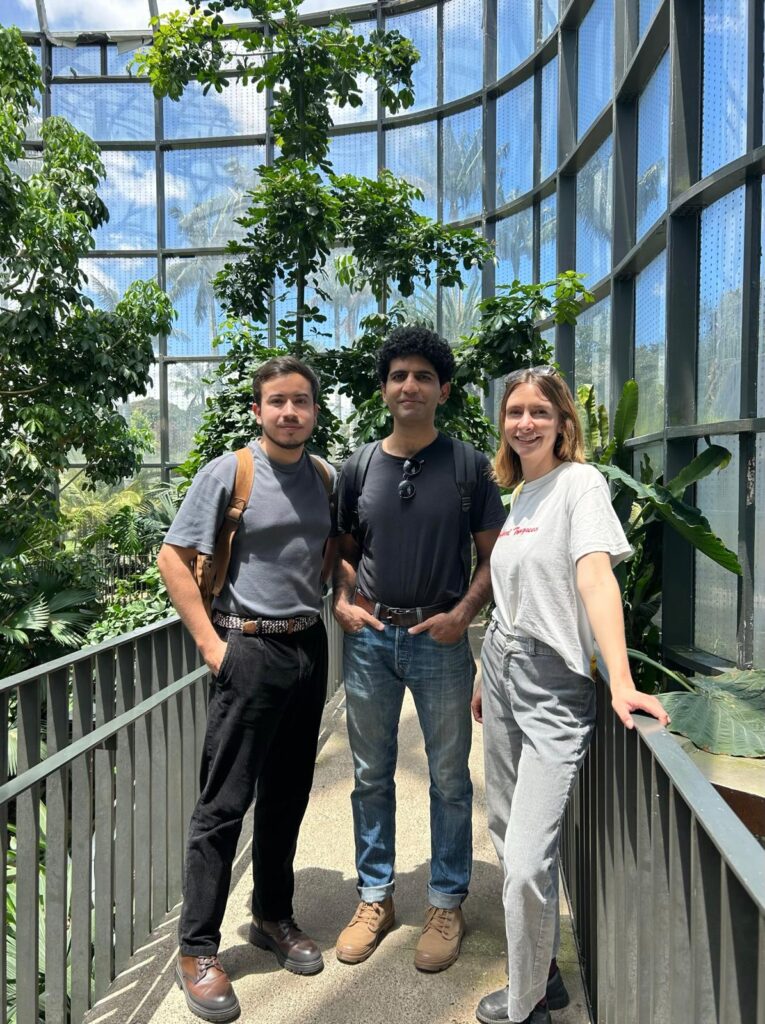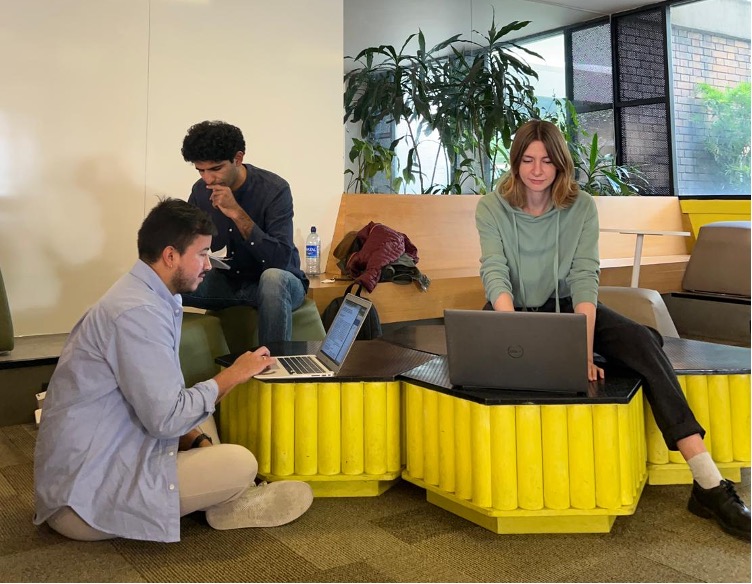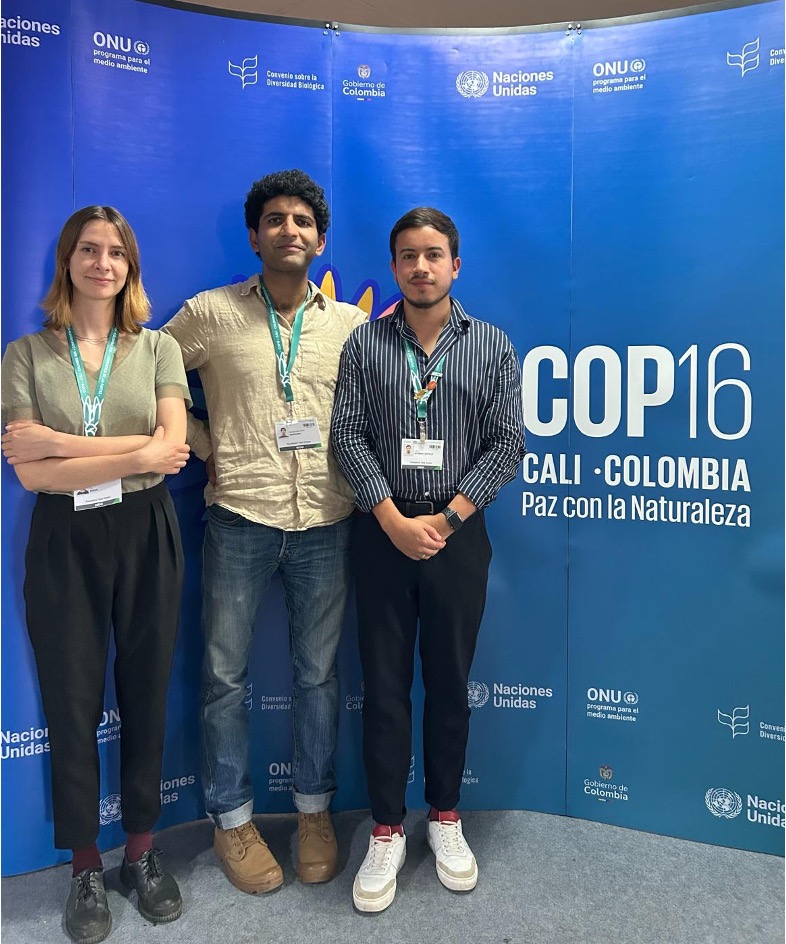The ocean, covering nearly three-quarters of Earth’s surface, is essential to life on our planet. A state of emergency now exists, however, due to the increasing cumulative impact of climate change and human activities. Securing a sustainable future for our ocean and planet depends on the urgent implementation of effective strategies and innovative approaches to strengthen marine protection and conservation.
 Visit to the Botanic Garden: Jose Celestino Mutis, Bogotá by BIOcean5D ECR co-authors of the policy brief: (from left to right) Julian Esteban, Umer Gurchani and Eva Wanek. Credit: Julian Esteban.
Visit to the Botanic Garden: Jose Celestino Mutis, Bogotá by BIOcean5D ECR co-authors of the policy brief: (from left to right) Julian Esteban, Umer Gurchani and Eva Wanek. Credit: Julian Esteban.
Connecting science and policy
BIOcean5D explores marine biodiversity and how it changes across 3D space, time and human impact. “A key component of BIOcean5D involves the integration of law, economics and philosophy with marine science. Assessing the values and rights of marine ecosystems enables the development of improved, more effective policies and strategies to protect marine life,” explains Sacha Bourgeois-Gironde, professor at Université Paris-Panthéon-Assas and leader of BIOcean5D’s work package 6 dedicated to this area.
“For change to happen, though, policy-makers must be informed about these new and innovative science-based approaches to protect and conserve marine ecosystems,” explains André Abreu, head of international policy at Tara Ocean Foundation and leader of BIOcean5D’s 7th work package dedicated to outreach, engagement and use of results. An important aspect of this work package thus involves the development of a strategy to connect scientists with policy-makers and thus bridge, and ultimately close, the science-policy gap.
 Visit and work in preparation of COP16 at Rosario University, Bogotá, one of the oldest and most prestigious universities in Colombia. From left to right: Julian Esteban, Umer Gurchani and Eva Wanek. Credit: Julian Esteban.
Visit and work in preparation of COP16 at Rosario University, Bogotá, one of the oldest and most prestigious universities in Colombia. From left to right: Julian Esteban, Umer Gurchani and Eva Wanek. Credit: Julian Esteban.
2024 UNCBD COP16: a unique opportunity
The 2024 UN Biodiversity Conference (UNCBD COP16) from 21 October to 1 November 2024 in Cali, Colombia, represents an unmissable opportunity to connect science with policy and strengthen ocean conservation. Seizing the potential of this event, a policy brief has been produced within the framework of BIOcean5D by a multidisciplinary team of researchers and ECRS (early career researchers). The work will be presented during a COP16 Blue Zone side event proposed by the University of Chile, Tara Ocean Foundation and Institut Jean Nicod at the Chile Pavillion.
“Current strategies are insufficient for the protection and conservation of marine ecosystems,” explains Roberto Casati, CNRS research director, professor at EHESS and director of the Institut Jean Nicod. “A broad range of innovative, multidisciplinary approaches that integrate the dynamics and complexity of marine ecosystems are needed to face today’s environmental crisis.” UNCBD COP16 is attended by participants from nearly every country in the world, including policy- and decision-makers, government and UN representatives, scientists, businesses and the general public. “Our policy brief – ‘Dynamic Oceans, Dynamic Solutions: New multi-disciplinary approaches for marine conservation tools’ – is designed to inform, trigger interest and initiate collaborations about innovative scientific approaches,” explains Abreu. “We hope that elements of our propositions will be integrated into ocean science policy, strengthening existing conservation efforts.”
 BIOcean5D ECR co-authors of the policy brief at 2024 UNCBD COP16, Cali (from left to right): Eva Wanek, Umer Gurchani, Julian Esteban. Credit: Julian Esteban.
BIOcean5D ECR co-authors of the policy brief at 2024 UNCBD COP16, Cali (from left to right): Eva Wanek, Umer Gurchani, Julian Esteban. Credit: Julian Esteban.